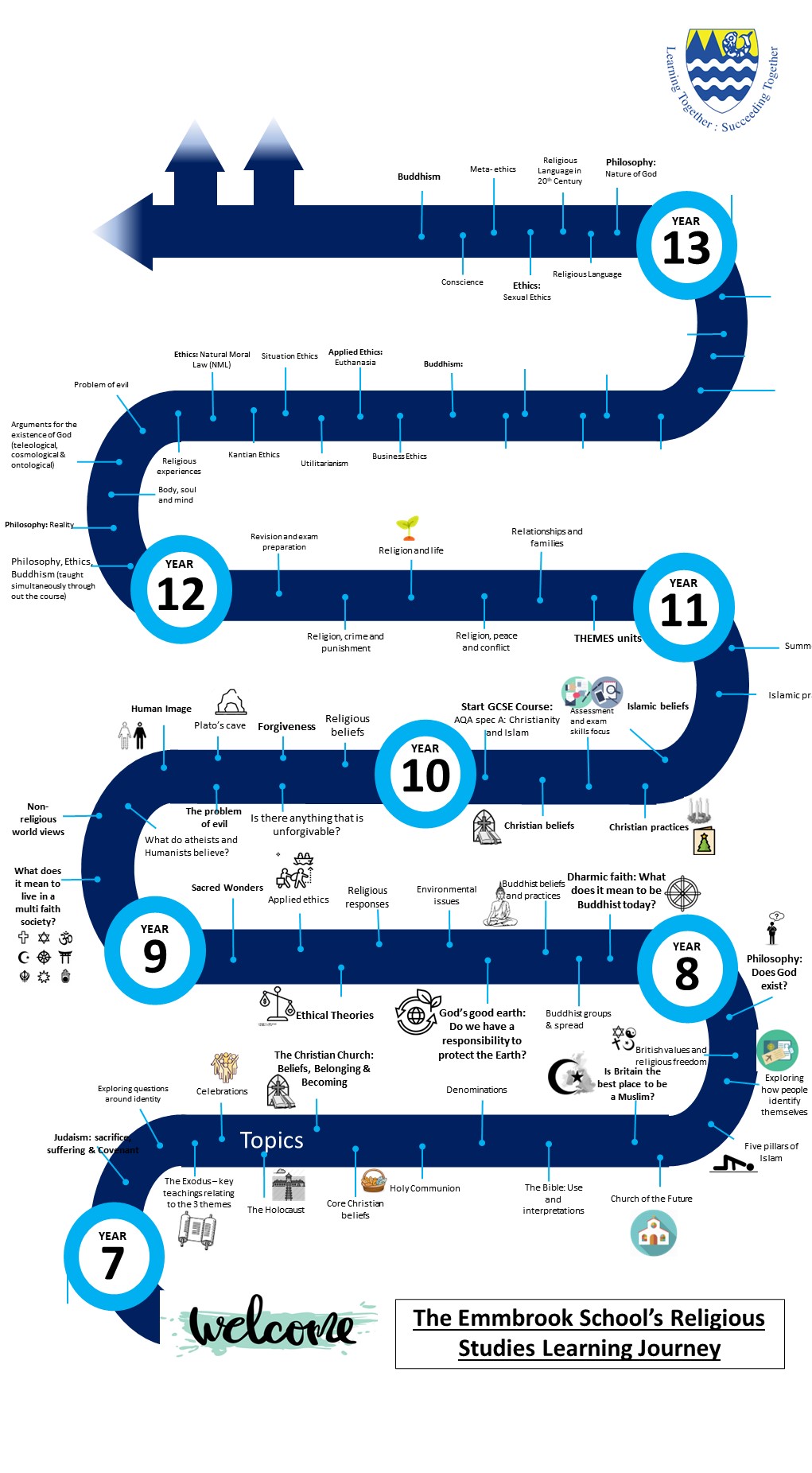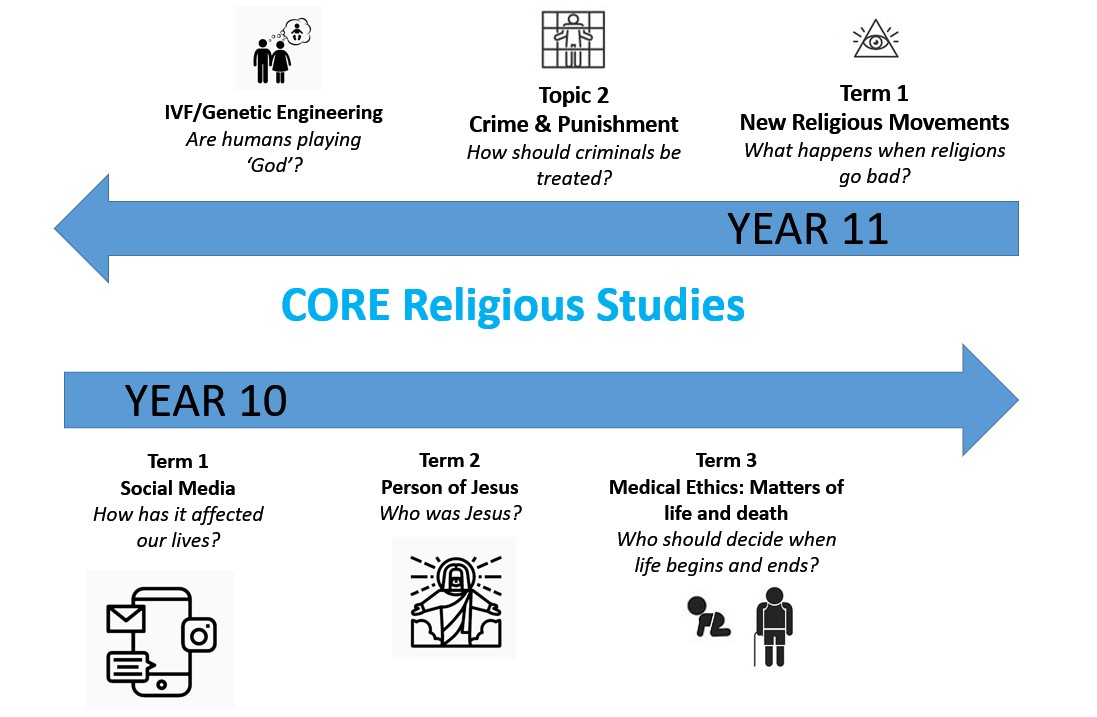Religious Studies
Who we are:
- Miss R Wood – Curriculum Leader
- Ms T Holdaway - Second in Department
- Miss Al-Sanjari
Key Stage 3 (years 7 and 8)
Year 7 - Autumn Term
Judaism - How has suffering, sacrifice, and covenant defined Judaism?
- Exploring the concept of Jewish identities
- Origins of the faith and introducing the themes of suffering, sacrifice, and covenant
- Key figures and teachings including Abraham, Isaac, and Moses
- Jewish celebrations including their history, meaning, and symbolism
- Suffering in modern Jewish history including the Holocaust and anti-semitism
The Christian Church – What is the ‘Church’?
- Exploring the faith through the concepts of ‘Believing’, ‘Belonging’, and ‘Becoming’
- Central Beliefs of Christianity including what is meant by the ‘The Christian Church’?
- What it means to belong to a community & knowing and understanding different denominations
- Recognising Christianity as a global religion
- Considering and exploring what the Church might be like in the future
Spring Term
Islam in Modern Britain – Is Britain the best place to be a Muslim?
- Introducing facts about Islam in Britain
- Knowing and understanding each of the 5 pillars of Islam
- Exploring issues of Identity – Can we have more than one identity? What does it mean to be British and by ‘British Values’?
- Understanding what is meant by religious freedom and comparing the UK with other countries
Summer Term
Philosophy of Religion
- Considering why people believe in God & exploring the question of whether God exists
- Reflecting on ‘Who is God’ and the nature of God
- Introduction to the following philosophical theories: Design argument, causation, the problem of evil and suffering.
- Questioning how the world came into existence
Year 8 - Autumn Term
Buddhism – What does it mean to be a Buddhist today?
- Exploring and understanding key Buddhist beliefs including the life of the Buddha, the Eightfold Path, and the 5 precepts
- Exploring the origins and spread of Buddhism focusing on Mahayana and Theravada
- Knowing and understanding Buddhist beliefs about life after death
- Exploring the impact the key beliefs have on the lives of Buddhists, and reflecting on whether it is more of a way of life than a religion
God’s Good Earth? – Do we have a responsibility to protect the Earth?
- Exploring a range of religious beliefs about the environment
- To consider different issues the earth faces and considering whether the earth needs protecting
- To understand different attitudes and beliefs about the origins of the world and consider the implications of these beliefs on our treatment and value of the earth
Spring Term
Ethics – How do we know right and wrong?
- Understanding what ethics is
- Exploring how people know what is the right or wrong way to act
- An Introduction to the following ethical theories: Absolutism, utilitarianism, situation ethics, the ethics of Jesus, virtue ethics
- Exploring different ethical dilemmas including the ‘Trolley Case Study’
- Knowing and understanding Human Rights
- Applied Ethics: Exploring what is the morally right thing to do in these situations: Animal testing and the Syrian refugee crisis, by applying different ethical theories and considering our human rights.
Summer Term
Sacred Wonders – Can anywhere be a place of meaning?
- To know and understand a range of significant sacred wonders from around the world and across cultures and beliefs including Uluru and the Golden Temple
- To consider what it is that gives these places such meaning
- To understand the impact of our actions on sacred places e.g. Tourism and consider ethical issues regarding social responsibility
- To consider whether sacred places are only religious
Year 9 – Autumn Term
Multi-Faith Society – What does it mean to live in a multi-faith society?
- To know and understand what a multi-faith society is and how they develop
- To know and understand the pros and cons of a multi-faith society
- To consider the social consequences of a multi-faith society including the role of dialogue
- Considering different religious perspectives, particularly within Christianity
Non-Religious World views – What do atheists and humanists believe?
- Knowing and understanding different non-religious world views, focusing particularly on Humanism
- Reflecting on how atheists and Humanists understand morality and find meaning and purpose
- Identifying similarities and differences between Humanism and major world religions
- Exploring and understanding non-religious attitudes towards significant life events and understanding the connections between our beliefs and actions.
Spring Term
Human Image – What does it mean to be ‘human’?
- Exploring different beliefs about the existence and relationship of the body and soul
- Studying and applying the ideas of different philosophers such as Aristotle, Plato, and Descartes.
- Exploring Plato’s analogy of the cave through media and considering what it teaches us about existence, truth, and the relationship of the body and soul
- Considering different beliefs about life after death and the origins of human life
Summer Term
Forgiveness – Is there anything that is unforgiveable?
- To know and understand what it means to forgive
- To know and understand a range of religious attitudes towards forgiveness
- To consider different reasons and implications of forgiveness
- To understand different attitudes and reasons using a range of case studies
Key Stage 4 GCSE (Years 10-11) – option
Examination Board: AQA - Specification A
GCSE Religious studies entail the study of the core religious beliefs, teaching and practices of two of the world religions. It also enables students to consider philosophical questions and ethical dilemmas which relate to modern life in Britain. The course challenges students with questions about belief, values, meaning, purpose and truth, enabling them to develop their own attitudes towards religious issues.
Assessment: Two examined units each worth 50%
Progression: Religious Studies develops your analysis, problem-solving, evaluating, writing, empathy, and communication skills. All these skills are transferable to all subjects at Key Stage 4 and 5 and in higher education or the workplace.
Religious Education allows you to
- explore the significance and impact of beliefs, teachings, sources, practices, ways of life, and forms of expressing meaning
- express their personal responses and informed insights on fundamental questions and issues about identity, belonging, meaning, purpose, truth, values, and commitments
- adopt an enquiring, critical, and reflective approach to the study of religion
- explore religions and beliefs, reflect on fundamental questions, engage with them intellectually, and respond personally
- enhance their personal, social, and cultural development, their understanding of different cultures locally, nationally, and in the wider world, and contribute to social and community cohesion
- develop their interest in and enthusiasm for the study of religion, and relate it to the wider world
- reflect on and develop their own values, opinions, and attitudes
KS 4 – yr. 10 & 11 CORE RS
A non-examined course providing students the chance to explore issues within contemporary society and evaluating them through a range of religious and non-religious perspectives.
Yr 10 Topics:
- The role of Social Media – How has it affected our lives?
- The Person of Jesus – Who was Jesus?
- Medical Ethics: matters of life and death – Who should decide when life begins and ends?
Yr 11 Topics:
- New Religious Movements – What happens when religions go bad?
- Crime and Punishment – How should criminals be treated?
- Genetic Engineering & IVF – Are humans playing ‘God’?


September 2023
